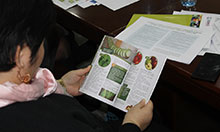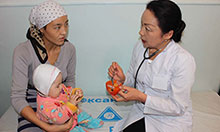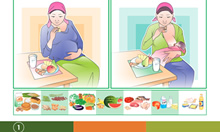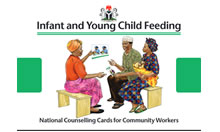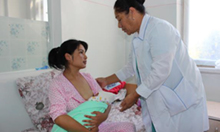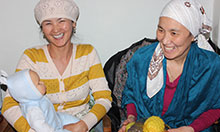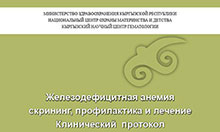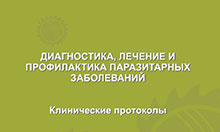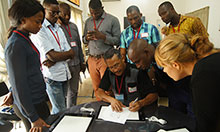SPRING in the Kyrgyz Republic
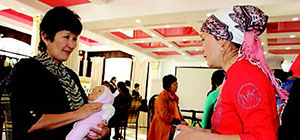
The SPRING project is a seven-year USAID-funded Cooperative Agreement to strengthen global and country efforts to scale up high-impact nutrition practices and policies and improve maternal and child nutrition outcomes. The project is managed by JSI Research & Training Institute, Inc., with partners Helen Keller International, The Manoff Group, Save the Children, and the International Food Policy Research Institute.
According to the 2012 Kyrgyz Demographic and Health Survey, 18 percent of children under 5 are stunted. In addition, 43 percent of children under 5 and 35 percent of women aged 15–49 have some degree of anemia. Although the country has made significant progress in reducing stunting since 1990, the levels of both stunting and anemia among children and women of reproductive age remain high. This can be attributed to multiple factors, such as dietary practices, low emphasis on nutrition services within the broader health system, lack of provider knowledge and skills in nutrition counseling, and low population awareness. Since late 2014, SPRING has worked at the community and national levels to address some of these factors and help reduce stunting and anemia in the Kyrgyz Republic through the uptake of 11 evidence-based practices. These practices, tailored to the Kyrgyz context, support optimal breastfeeding, appropriate complementary feeding of children, dietary diversity throughout the year, reduced consumption of junk food, handwashing at critical times, and other household-level behaviors targeting women and children in the first 1,000 days (from pregnancy to two years).
We work in 11 rayons and townships in Jalalabad oblast, including Jalalabad city; all six rayons and townships in Naryn oblast, including Naryn town; and the capital city Bishkek.
Availability and access to quality nutrition services and counseling are critical to the uptake of the 11 priority practices and related services. To enhance the quality of nutrition-related services, we work to strengthen nutrition policies at the national level as well as to strengthen the health system by building the capacity of health workers through in-service training and preservice medical education of future doctors and nurses.
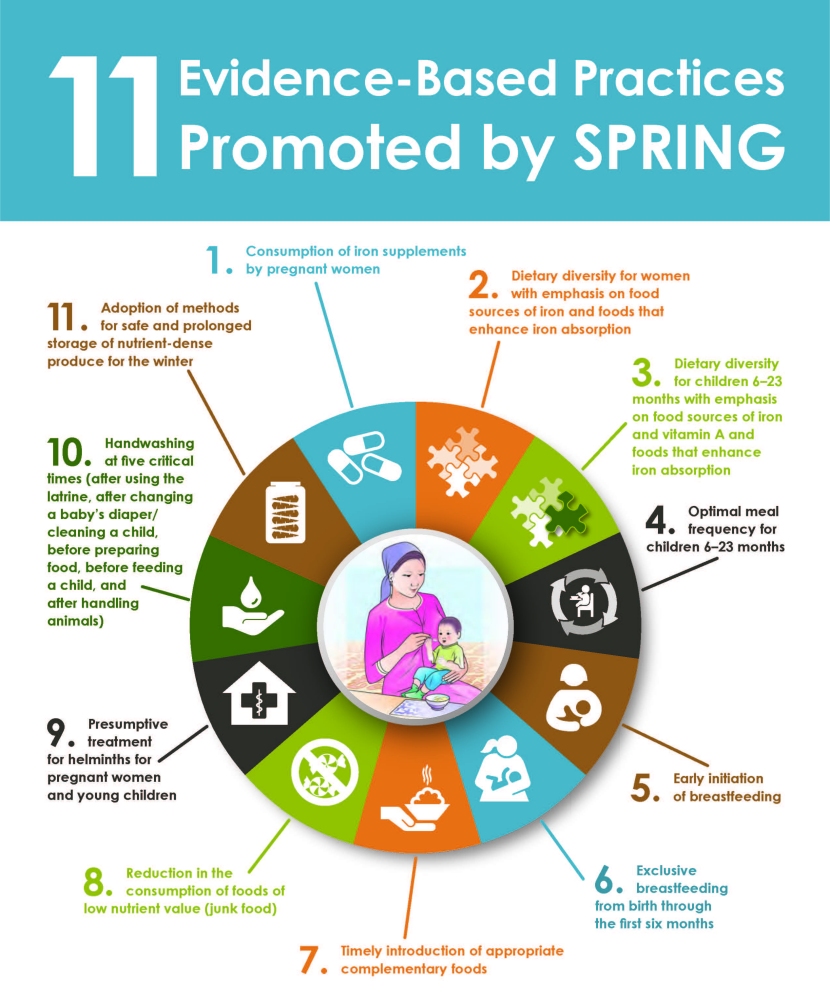
Increasing Access to Quality Nutrition Services
Advocating for Nutrition Policies
We engage with the Ministry of Health (MOH), academia, multilateral organizations, and other partners at the national level to address gaps in policies and technical guidelines, with the goal of supporting improved nutrition services nationally and in SPRING target geographies. By bringing together stakeholders around priority policy gaps, as well providing technical assistance and administrative support, we have moved policy forward in the areas of anemia prevention and treatment, deworming, antenatal care, and supportive supervision and quality improvement mechanisms within the health system.
Prevention and Treatment of Anemia Guidelines
The World Health Organization (WHO) recommends that women consume iron and folic acid throughout pregnancy. These are usually supplied in a combined tablet known as iron–folic acid (IFA), but the two supplements are not combined in the Kyrgyz Republic.
The 2002 government protocol for treating anemia in pregnant women called for women to be prescribed 300 mg of iron (without folic acid) for 90 days if they tested positive for anemia at their first prenatal visit. If diagnosed with anemia, they were given the prescription and told to return in two weeks. Hemoglobin was tested twice more during the pregnancy. Our formative research found that most health workers did not fully follow this protocol. Some women never received the prescription, the prescription did not specify dosage, or there was no follow-up to ensure adherence to treatment.
We supported the development and finalization of the National Technical Guideline on the Prevention and Treatment of Anemia, providing technical assistance to the national working group in April 2015, with subsequent guideline approval by the MOH in September 2015. This new guideline constitutes a policy change that—for the first time in the Kyrgyz Republic—recommends (1) providing IFA to all women of reproductive age and to all pregnant women throughout the course of their pregnancy and for three months after the delivery of their baby, and (2) presumptive deworming for children and women (including during pregnancy). We supported the rollout of the technical guideline and facilitated the approval of clinical protocols to instruct doctors on appropriate treatment. We printed 3,000 copies of the new technical guideline for all health facilities in our implementation areas and printed 10,000 copies of the anemia protocol for distribution to all government health facilities nationally.
pull-right three clear-both">
a health care worker with help from counseling cards. ">
Spotlight: IYCF Counseling Cards
SPRING spearheaded the adaptation of the generic infant and young child feeding (IYCF) counseling cards to make them more appropriate and accessible in the Kyrgyz context. These cards are used by trained health providers when counseling mothers and caregivers on optimal IYCF practices. We provided sets of the 21 counseling cards to all health providers in our project areas.

care worker with help from counseling cards. ">
Deworming and Helminth Prevention Strategies
Historically, deworming campaigns in the Kyrgyz Republic have focused on the distribution of deworming medication through the school system, when specific donor funds are available. National deworming campaigns, held every couple of years, did not include communications materials to raise awareness of helminth infection prevention, and did not target family members other than children, such as pregnant women, which are measures recommended in the new national Anemia Technical Guideline. Outside of mass deworming campaigns, children receive treatment for helminth infection only upon confirmed diagnosis by a health provider.
A national deworming working group, comprising relevant government agency representatives and chaired by the Sanitation and Epidemiology Department of the MOH, was formed to review existing information, education, and communication (IEC) materials; campaign strategies; and interdepartmental cooperation plans. The working group developed a new clinical protocol for deworming and helminth infection prevention, approved by the MOH in February 2017. The deworming protocol incorporates the latest national guidelines and protocols, global recommendations, international deworming experience, and input from multiple stakeholders in the Kyrgyz Republic. The working group also revised the deworming strategy and IEC materials based on the new clinical protocol.
We disseminated the protocol nationally, and the working group coordinated partners around deworming campaigns, guided national surveys/assessments of disease burden, and supported the government in developing messages around the prevention of helminth infection, particularly for pregnant women and children under two. We also conducted trainings on the revised protocol beginning September 2017.
Antenatal Care
Beginning in September 2017, SPRING supported a national technical working group to ensure that new evidence-based recommendations—particularly for prevention and treatment of anemia and parasitic infections—were incorporated into the national ANC clinical protocol. The revised protocol was presented to stakeholders for comment and discussion, underwent an external review by WHO, and was approved by the Ministry of Health in April 2018. We then supported the printing of 15,000 copies for distribution to all primary health care facilities in the country.
Strengthening Nutrition Services
Infant and Young Child Feeding
Over the past decade, the United Nations Children’s Fund (UNICEF) and WHO have collaborated to create a training curriculum that has been used in 64 countries to improve the skills of health professionals in counseling caregivers on appropriate infant and child feeding (IYCF). This training package has proved successful in enhancing the skills of facility-based providers around the world. In 2008, the MOH adapted the IYCF training package, and developed a cadre of master trainers at national and oblast level responsible for training providers.
Using this counseling package, we trained 63 master trainers at the national level and provided cascade training to 1,503 health workers in Jalalabad and Naryn oblasts at all levels of the health system (see figure 1). THE MOH has welcomed the IYCF trainings, and we have received requests to expand its IYCF trainings in other parts of the country. For example, on request we carried out a special series of IYCF trainings for 228 providers in outpatient facilities in Bishkek city. While training in the IYCF counseling package is intended to build the capacity of health workers to deliver high-quality nutrition services and counselling, it was also provided to select administrative personnel and inspectors from the mandatory health insurance fund, who are responsible for quality assurance and the audit of medical records in health facilities across the country, to encourage adoption and institutionalization of the approach.
Figure 1. Number of SPRING-trained Health Providers, by Topic
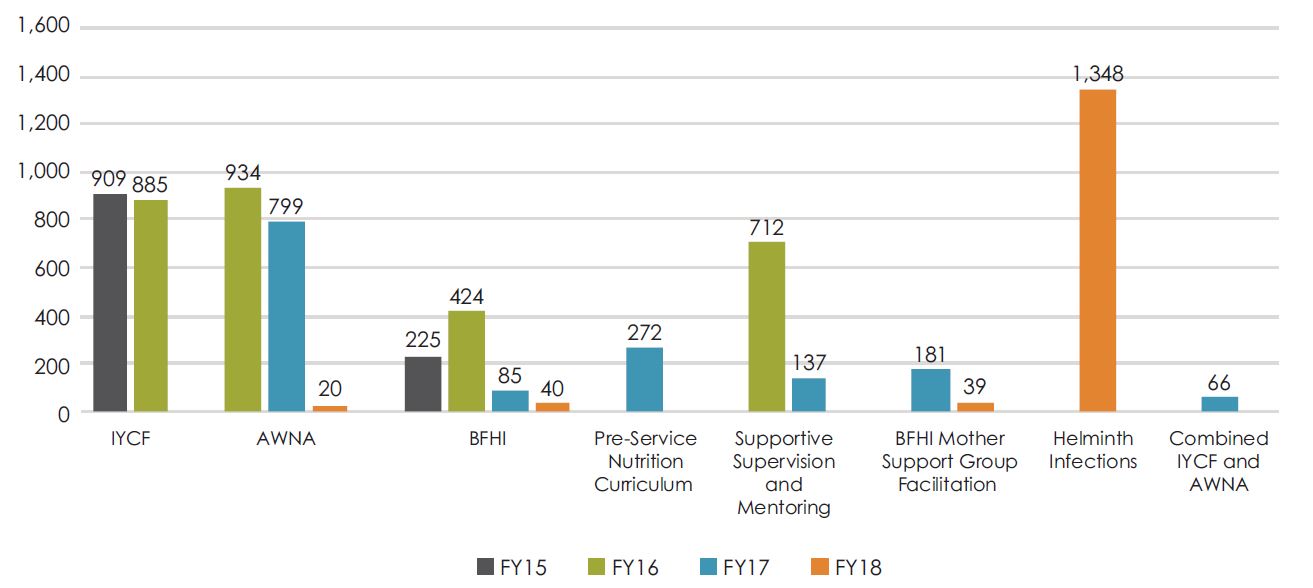
SPRING is strengthening the supportive supervision system with regular mentoring and tools. We developed an observation checklist that encompasses IYCF in addition to adolescent and women’s nutrition and anemia (AWNA), to strengthen nutrition services and counseling skills at the facility level. We adapted and rolled out trainings on IYCF supportive supervision to 849 medical supervisors in 319 health facilities across our implementation areas. This training equipped medical supervisors with skills and tools to help them deliver high-quality IYCF services and counseling in their facilities. Our staff and trainers have conducted over 5,805 on-the-job supportive supervision visits with health workers in Jalalabad and Naryn, alongside facility managers, supervisors, and peer mentors. In fiscal year 2016, we facilitated supportive supervision of 686 health providers throughout our implementation areas, which saw a 42 percent increase in the average assessment score of observed providers from the previous fiscal year.
As a result of our national-level IYCF training, key “first 1,000 days” nutrition messages have been included in a national health program of wellness checks for children 0–17 years of age. The government issued a prikaz, or decree, to all health providers, entitled “Supervision of Healthy Children in the First Stage of Life.” The prikaz focused on health services for children under two, including promotion of and counseling on exclusive breastfeeding, continued breastfeeding for two years, appropriate timing of complementary foods, dietary diversity, and meal frequency.
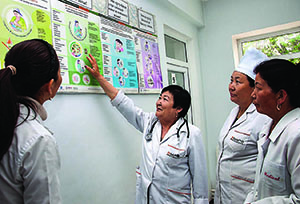
Building a System for Supportive Supervision
A strong supportive supervisory system will allow the government to address gaps in service quality through regular monitoring, and will ultimately ensure that health workers at family medicine centers and hospitals provide quality nutrition counseling to pregnant and lactating women.
SPRING utilized technical assistance from an international expert in supportive supervision, who assessed our work in this area, and conducted a three-day training for 849 national- and regional-level health managers, supervisors, and trainers on supportive supervision and mentoring to promote the use of these methods as a means of sustaining quality of health providers and services. The training was well received at the national level, and discussions are underway on ways supportive supervision and mentoring can be rolled out in the health system.
Supportive supervision and mentoring are not widely practiced in the Kyrgyz Republic’s health system. We believe supportive supervision can play an important role in improving the quality of many different types of health services, in a context where quality assurance mechanisms are not systematically employed. The MOH is interested in SPRING’s work to ensure the quality of services and counseling after training. However, additional advocacy is needed to help the MOH identify how and where to apply these concepts in health service delivery, because the ministry is more accustomed to hierarchal forms of management and quality assessment.
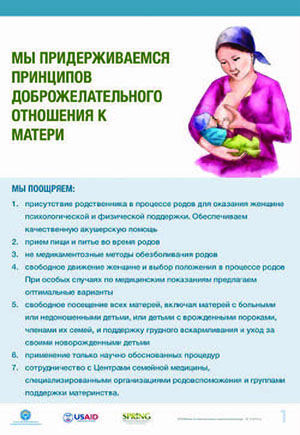
Baby-Friendly Hospital Initiative Job Aids
In collaboration with the MOH, we designed a set of 10 posters that describe the principles of a “friendly” approach toward mother and baby, as well as breastfeeding steps. The posters were distributed by the MOH to all health care institutions nationally.
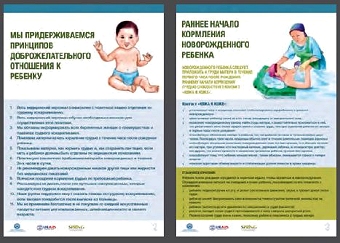
Adolescent and Women’s Nutrition and Anemia
In 2015, we developed a training curriculum on adolescent and women’s nutrition and anemia that included nutrition guidance appropriate for women in different stages of the life cycle: adolescence and pre-pregnancy, pregnancy, and non-pregnant adulthood. We included adolescents and non-pregnant adult women because nutrition in these groups is an important but often overlooked issue in maternal nutrition initiatives. This training also focused on the new national anemia guidelines for health care providers, which include new prevention and treatment protocols for various life cycle groups (i.e., children, women of reproductive age, pregnant women, and older people).
We conducted a national training of trainers for a pool of 28 trainers who are able to support cascade trainings in and beyond our implementation areas. Subsequently, we rolled out cascade trainings to reach 1,207 primary health care providers—doctors, nurses, and feldshers (village-level health workers)—throughout Jalalabad and Naryn. Additionally, on request we carried out trainings in Bishkek for 518 pediatricians and ob-gyns.
Given the broad recognition of anemia as a problem among women and children, the rollout of our training was very well received at the national and local levels. Although our training coincided with the availability of IFA supplements procured by the MOH with other donor funds, the regularity of IFA procurement is not presently secure, which may create a barrier to appropriate IFA consumption for anemia prevention.
Prevention and Treatment of Helminth Infections
In January 2017, the MOH approved a new protocol for the prevention and treatment of parasitic infections caused by helminths. SPRING provided technical assistance to a national working group to develop a curriculum for training health workers on the new protocol, which included external reviews by technical experts at WHO Regional Office for Europe and SPRING home office. The project conducted three TOTs in Bishkek, Jalalabad, and Naryn, creating a national pool of 59 master trainers. Subsequently, SPRING trained 1,289 healthcare providers, including family doctors and nurses, laboratory technicians, parasitologists, and FMC administrative staff, through one-day cascade trainings in Jalalabad and Naryn.
Baby-Friendly Hospital Initiative
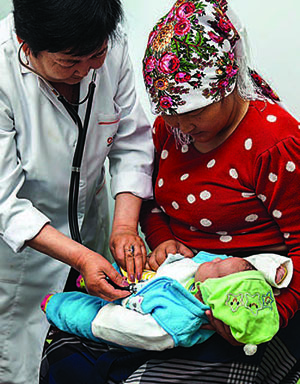
Strengthening BFHI Certification
The criterion for mother support groups has not been given enough attention in the past, and the BFHI requThe criterion for mother support groups has not been given enough attention in the past, and the BFHI requirement is often satisfied with the most basic forms of communications between new mothers and health workers. Mother support groups are generally not organized in the Kyrgyz Republic due to a lack of experience with group facilitation.
To strengthen this aspect of BFHI certification, we developed a training curriculum and trained 220 health providers on group facilitation and BFHI-consistent on-the-job skills building. The training culminated with functional demonstrations on appropriate facilitation of mother support groups that can be used to inform other BFHI-certified or aspiring facilities, as well as for advocacy.
The Baby-Friendly Hospital Initiative (BFHI) was initiated in 1991 by WHO and UNICEF to encourage and recognize health facilities that offer optimal care for and support of optimal breastfeeding and mother-child bonding. Participating hospitals undergo a process of planning, training, and organizational and policy changes to achieve 10 steps. When they meet the 10 required steps, the hospital is certified “Baby Friendly.” The national BFHI committee has been operating in Kyrgyz Republic for 20 years, but often relies on donor funding for the preparation and BFHI certification for facilities. In the Kyrgyz Republic, BFHI has been adjusted slightly for national application, calling the certification “Mother and Baby Friendly.” “Mother” was added to the title to make it more holistic, and the mothers’ group criterion (step 10) was redefined, replacing the peer support group with a hotline for mothers to call for advice. The perception at that time in the Kyrgyz Republic, as well as other post-Soviet countries, was that health-related advice should be provided only by medical professionals. We are currently working to bolster this criterion by building the capacity of health providers to facilitate mother support groups.
Earning BFHI certification is not easy for low-resource hospitals. Prior to our intervention, these hospitals lacked baby-friendly policies, employed staff who were not trained in optimal breastfeeding practices, and embraced widespread bottle-feeding of newborns. We conducted trainings on the BFHI package for 774 health providers and administrators across 10 hospitals, 11 family medicine centers (FMCs), and 6 General Practice Centers (CGPs); these trainings reinforced BFHI principles to improve the quality of services provided at these facilities during antenatal and postpartum care. Although FMCs do not conduct deliveries, the national BFHI committee included FMCs as the highest-level outpatient facility in the health system, in recognition of the extensive care provided through these facilities and to ensure consistency of care between FMCs and hospitals.
Understanding the importance of certification, facilities welcome the BFHI training and self-assessment process but face serious challenges, including insufficient technical capacity among staff (including medical specialists), high staff turnover, and aggressive marketing of breastmilk substitutes. Lack of commitment by leadership also poses a barrier. We have worked to address this by meeting with facility heads to convey the importance of BHFI policies and improvements and by involving them in trainings to gain their commitment to achieving and sustaining baby-friendly certification.
We performed quarterly monitoring of BFHI-aspiring facilities to support progress in the 11 areas necessary for BFHI certification,1 including assistance with the hospitals’ self-driven improvement plans as well as establishment and facilitation of mother support groups. We are providing training on mother support group facilitation to strengthen this neglected part of the 11 steps.
We supported hospital staff in implementing a continuous monitoring plan to ensure that BFHI standards are maintained over the long term, and that funds are available for annual certification. To date, 17 facilities (7 hospitals, 8 FMCs, 2 CGPs) have 10received BHFHI certification after independent assessment by the national BFHI review committee. An additional eight facilities will be evaluated by the committee in May 2018.
Strengthening Preservice Nutrition Education
Although in-service training improves the capacity of active health workers in the project’s implementation areas, strengthening the nutrition preservice training will have a much deeper impact on the content and quality of future nutrition services nationwide. This advocacy complements ongoing efforts by the Food and Agriculture Organization to incorporate a nutrition course in the National Agrarian University syllabus and work by the USAID-funded Quality Health Care Project to improve the antenatal care curriculum at medical colleges in the country.
Using the platform of the SUN Academia subgroup, we spearheaded efforts to strengthen the nutrition content in preservice medical training by hosting a high-level meeting for representatives from medical universities and colleges that train doctors and nurses. At the meeting, we shared how nutrition could be included in preservice education and achieved consensus on how to proceed.
A preservice working group comprising academic representatives from medical training institutions in Bishkek, Jalalabad, and Naryn came together to develop improved nutrition content for integration in preservice education and routine coursework of doctors and nurses. Priority was given to incorporating globally recommended nutrition content, including anthropometry, and nutrition counseling skills.
In March 2017, the MOH and academic institutions approved the updated content. Since then, we have trained 272 faculty members across 14 medical colleges and 4 universities on the new nutrition modules for immediate integration into their teaching curricula. The MOH also issued a prikaz instructing all medical universities and colleges nationwide to adopt and incorporate this content into their curricula. All 19 medical colleges and 4 universities moved forward with this integration, starting in the 2017-2018 academic year.
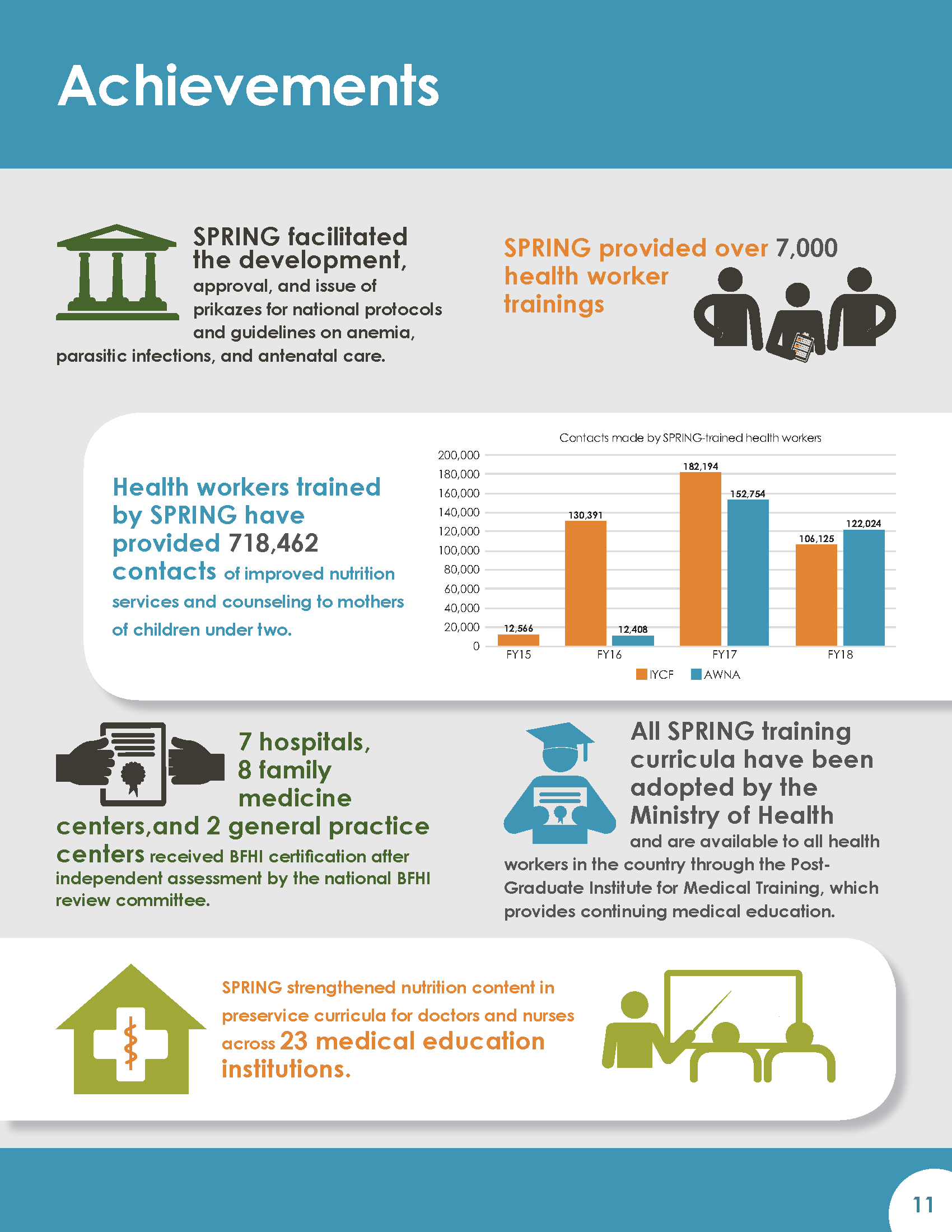
Footnotes
1 In the Kyrgyz Republic, BFHI has been re-envisioned to have 11 criteria, rather than the global standard of 10. Step 11 reinforces the guidance that formula is only given to newborns for medical reasons, to ensure compliance with the International Code of Marketing of Breast-milk Substitutes.
